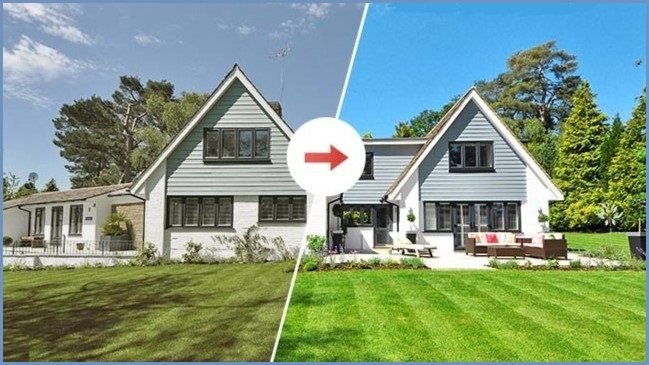
AI can remove trees, add decks, and make the grass greener. Photo: AVC
NSW landlords and agents will need to admit when they’ve used AI to deceptively edit real estate pictures under new laws introduced by the NSW government.
The Residential Tenancies (Protection of Personal Information) Amendment Bill 2025, announced Sunday, will tackle photoshopped and AI-doctored images by introducing mandatory disclosure requirements on misleading rental ads.
Further to introducing a slew of tenant-friendly data privacy measures, the NSW government announced landlords and agents will need to disclose when images have been altered to “conceal faults” and “mislead rental applicants”.
Should the legislation pass parliament, the penalties for non-disclosure will be $5,500 for individuals and $22,000 for businesses.
While the bill doesn’t single out AI, the government cited an example of “artificially generated furniture” that showed a double bed in a room only large enough to fit a single, and further noted advertisers must disclose when “digitally modifying photos” to obscure property damage.
On Monday, the Tenants’ Union of NSW welcomed the legislative changes.
“Growth of AI or digital manipulation has raced ahead in advertising of rental homes,” wrote the union.

A before and after AI photo using Autoenhance.ai. Photo: Autoenhance.ai
“[These changes] will provide better protections for renters personal information and help prevent renters applying for homes being misled when AI-generated photos are used in the advertisement.”
The new fisheye lens
Renters have long lamented the use of photo editing and fisheye lenses to brush up unattractive property listings and make rooms seem larger, but the advent of AI has introduced dedicated real estate tools which can furnish bare apartments, scrub unwanted details and shift the perspective of an image in seconds.
%20(002)%20169.jpeg)
It may not look like much before AI…. Photo: 4editor.com
%20(002)%20169.jpeg)
But AI shows the room’s potential. Photo: 4.editor.com
On the curtly named subreddit “r/shitrentals”, Australian tenants reported an NSW property listing with what appeared to be an AI-edited sheen over mouldy ceilings.
Another Queensland listing appeared to reimagine a dimly lit kitchen using an image generator, while photos for a rental in Victoria had clear signs of warping and were seemingly styled with cartoonish, AI-generated furniture.
An NSW Fair Trading spokesperson told Information Age the agency had received reports of images being “digitally altered” to obscure property damage, while Victorian Socialists’ former Senate candidate Jordan van den Lamb said he’d seen “countless rooms” enlarged to appear bigger than they are, or edited with AI to “smooth” surfaces that are either “patchy, mouldy, or riddled with holes and cracks.”
“There are no longer any notable, individual examples [to cite] because the use of this technology, as well as Photoshop, is so prevalent,” said van den Lamb, also known as housing influencer Purplepingers.
Van den Lamb added the newly proposed laws were not sufficient.
“These laws are effectively a concession where the NSW Labor government says ‘oh, I guess misleading advertising is fine as long as you admit you’re doing it’,” he said.
“Laws that prohibit misleading and deceptive conduct already exist federally – they should perhaps consider enforcing them.”
Privacy principles applied to landlords
The new legislation will also apply the Privacy Act’s Australian Privacy Principles to landlords and agents in a bid to crack down on excessive tenant data collection.
Alongside a spate of new privacy mechanisms aimed at the collection, use and destruction of tenants’ personal information, the Minns government declared a forthcoming “standard rental application form” to make clear what information “can and can’t be collected”.
The government – which estimated around 187,000 pieces of identification information are collected from NSW renters every week – said the bill “will stop the unnecessary collection of extra personal information” and help “reduce the risk of identity theft and data breaches”.
“Renters shouldn’t have to trade away their privacy just to find a place to live,” said NSW Rental Commissioner Trina Jones.
“This legislation will see sensible limits on what information can be collected in a rental application, creating a fairer and more consistent process, and gives rental applicants more control over their personal data.”
Penalties for failing to follow the new privacy rules are capped at $11,000 for individuals and $49,500 for corporations.





